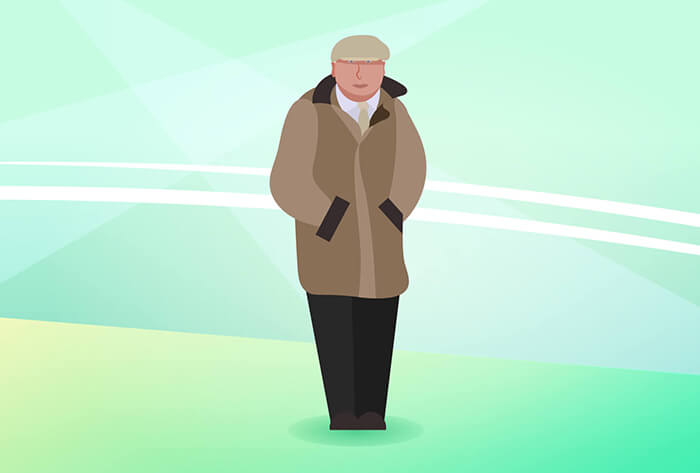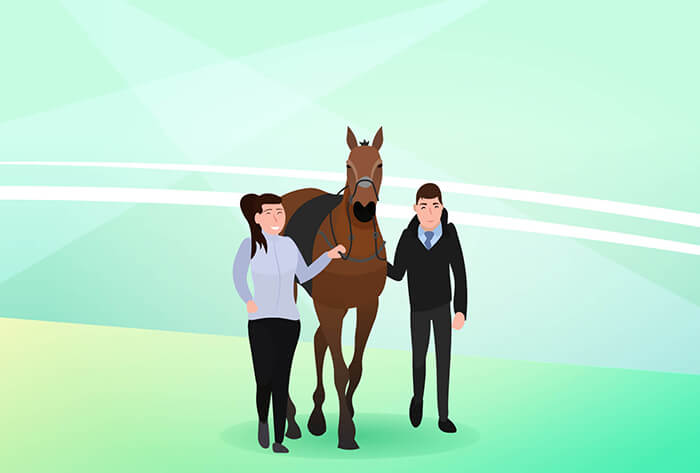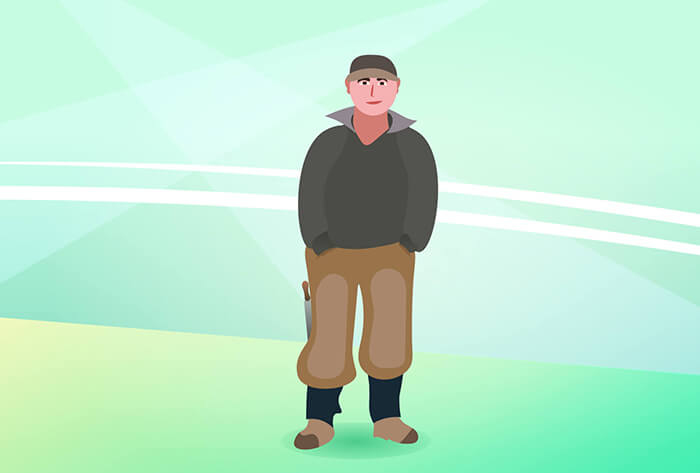Everyone is used to seeing a jockey ride a horse home to victory, the two operating together in perfect synch to achieve their goal. Long before either can get to that point, however, an enormous team of people has already been assembled, each one with their own expertise and skillset. We asked HRUK ambassador Bryony Frost to provide us with a rundown of everyone involved in getting horses into that winning position.
The head of the pyramid. They plan where the horse will run and his training regime, while communicating with everybody connected with that horse. Owners, staff, jockey, it’s all about that communication. It’s the trainer who knows the horse the best and that's built up through various bits of data, runs and calculations. They’ll know which course, which ground and which jockey the horse will suit. They have to calculate absolutely everything.

They pretty much do everything that the trainer does, offering a second pair of eyes and ears, as well as represent on the racecourse when the trainer can’t be there. They’re also making sure all the little things are being done as well, so that the trainer doesn’t have to be everywhere at once. Trainers use them to come up with suggestions and bounce ideas off each other, too.
Racing is a social network with many opinions. It’s a live market out there and owners can take their horses anywhere they want. It’s their horse so they put all their trust into the trainer and their team, and everybody has to get on. It’s not just race days when they see their horses, they can come and see them training if they want to. Quite a few owners will also have their horses home for the holidays, but some stay on the yards for their summer breaks.
A vital part in the pyramid of a team – your head lad or lass, combined with the trainer, are the brains of the operation. They’re the walking dictionaries of the horses and if you need to know anything about a horse, you ask them. They’re extremely experienced when it comes to a horse’s health and they’re responsible for the yard's routine. They look after the horses and make sure they’re happy and healthy, but the head lad or lass also has to perform the same role with the staff. They’re a huge, huge part behind the scenes and the people staff turn to. They never miss a day and live and breathe the horses in the yard.

A massive part of the mechanics within the team, they have the huge responsibility of making sure a horse travels safely to a race and that they’re happy during the time that they’re there. That includes jockeys, too, because they’re in charge of humans and equines at races. They’re the ones making sure everyone has everything ready at all times so it’s lots of checks, all of the time. The hours are long and the work is hard.
Pupil assistants are training to become a trainer, or simply building up their experience. They oversee the smaller things. If a horse needs bandaging, or their bucket is broken, or a horse’s tail needs trimming, that type of thing. They keep the whole place well sewn up and ticking along.
I cannot emphasize how hard-working a yard’s stable staff are. They’re obsessed with the horses that they look after. Some stable staff will be with a horse from the moment a horse arrives to the day it leaves. They’ll look after them day in, day out, and sometimes ride them as well. A horse having someone who is with them every day, getting used to them, confiding in them at races, is such a comfort to them. They report any small injuries, or if the horse didn't have their breakfast that morning, that type of thing. They’re the ones making sure every hair on its head is facing the right way. They’re also supported by part-time staff, who come in and ride out, but don’t muck out at the yard.
The old saying is “no hoof, no horse”. You can’t drive a car with a flat tyre and the same is true of horses. Racehorses need light steel horseshoes at home, then aluminium (because they’re lighter) for racing. Every horse has unique feet, and shoes have to be cut to suit them, so farriers have to be incredibly skilled at their job. They’re obviously a vital part of the team and always in demand.

They will make sure everything is fresh, every day. It’s very important that a groundsman ensures that his gallop isn’t rolled too fast and becomes uneven. They have to be rolled at the right time so that it’s fresh and the horses can work effectively. If there is schooling going on, the ground has to be ready for that. They mow the grass, but also make sure the posts and rails are all in good condition. Every day they’ll be out before anyone else, making sure everything is good to go and that it’s clear for the horse to gallop up.
These guys work full time but don’t ride the horses. They’re in the yard all morning and all afternoon changing walkers – when horses go down to walk and stretch their legs. When the trainers, riders and everyone else is is out, off on the gallops, they’re back at the yard in case something goes wrong so that the horses are always overseen.
Yards won’t have an onsite vet around the clock, they will come in as and when they’re needed. That might be for things like administering vaccinations, or check-ups to see if the horses’ bodies are all ok and everything looks good. Obviously if a horse is injured or sick, it’s their responsibility to help get horse fit and healthy again and ready to race.

We have a physio per yard who comes in once or twice a week, because the horses are athletes after all, and need to be kept supple and even. If they start holding one side of their hamstring they might end up over-compensating and go over to the other side, which may cause pelvis issues. Minor injuries and niggles can cause bigger problems down the line and, like any athlete, a physio plays a crucial part in getting them to the track.
They come in every six months and check all the teeth of all the horses in the whole yard. They’ll ensure they don’t have any teeth that are too sharp or anything else that might aggravate them. If a horse has an abscess in its mouth, it can travel into its jaw, into its sinuses and affect their breathing. They check all these little things like a fine-tooth comb to make sure they’re good to go.